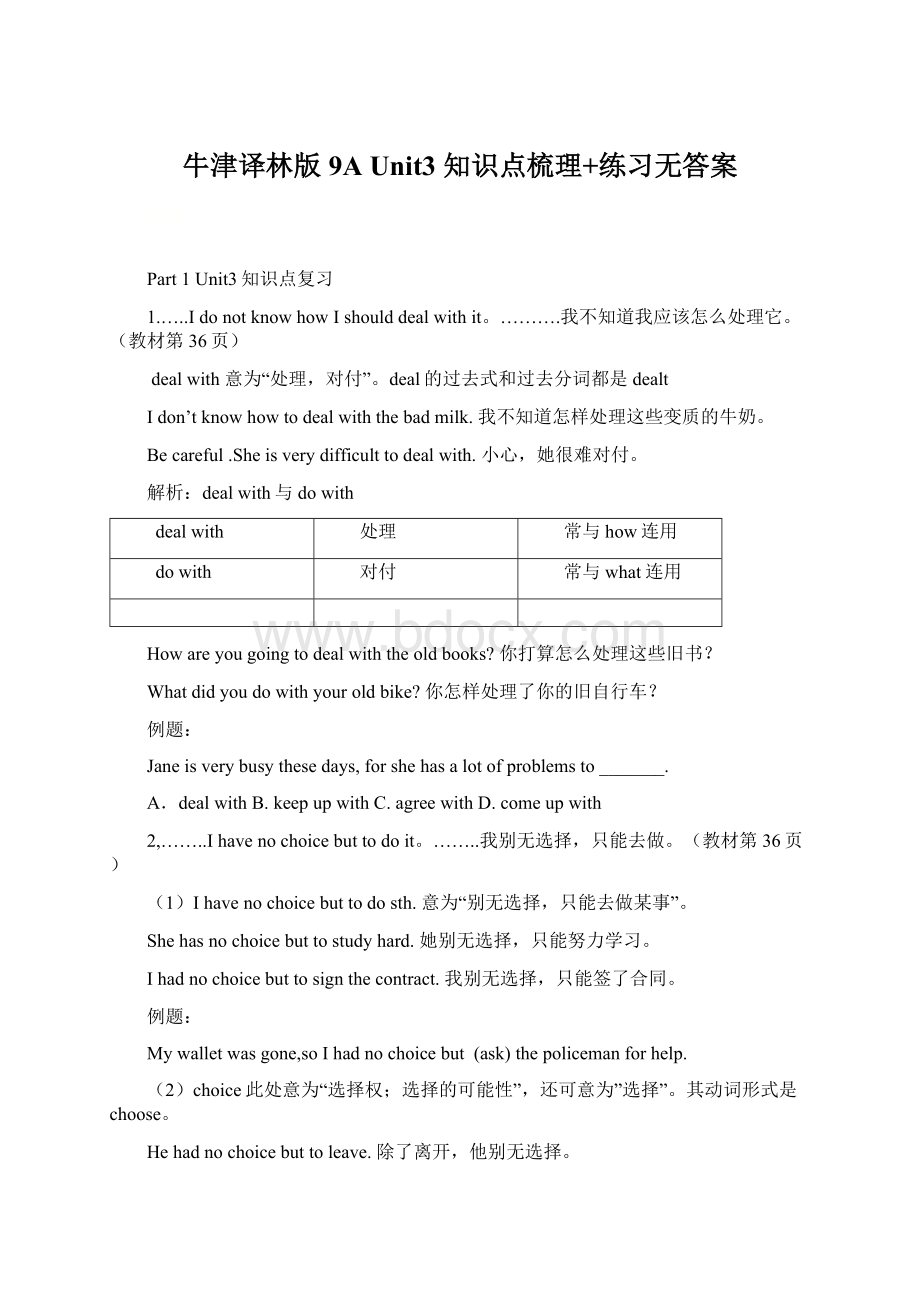牛津译林版9A Unit3 知识点梳理+练习无答案.docx
《牛津译林版9A Unit3 知识点梳理+练习无答案.docx》由会员分享,可在线阅读,更多相关《牛津译林版9A Unit3 知识点梳理+练习无答案.docx(17页珍藏版)》请在冰豆网上搜索。

牛津译林版9AUnit3知识点梳理+练习无答案
Part1Unit3知识点复习
1.…..IdonotknowhowIshoulddealwithit。
……….我不知道我应该怎么处理它。
(教材第36页)
dealwith意为“处理,对付”。
deal的过去式和过去分词都是dealt
Idon’tknowhowtodealwiththebadmilk.我不知道怎样处理这些变质的牛奶。
Becareful.Sheisverydifficulttodealwith.小心,她很难对付。
解析:
dealwith与dowith
dealwith
处理
常与how连用
dowith
对付
常与what连用
Howareyougoingtodealwiththeoldbooks?
你打算怎么处理这些旧书?
Whatdidyoudowithyouroldbike?
你怎样处理了你的旧自行车?
例题:
Janeisverybusythesedays,forshehasalotofproblemsto_______.
A.dealwithB.keepupwithC.agreewithD.comeupwith
2,……..Ihavenochoicebuttodoit。
……..我别无选择,只能去做。
(教材第36页)
(1)Ihavenochoicebuttodosth.意为“别无选择,只能去做某事”。
Shehasnochoicebuttostudyhard.她别无选择,只能努力学习。
Ihadnochoicebuttosignthecontract.我别无选择,只能签了合同。
例题:
Mywalletwasgone,soIhadnochoicebut(ask)thepolicemanforhelp.
(2)choice此处意为“选择权;选择的可能性”,还可意为”选择”。
其动词形式是choose。
Hehadnochoicebuttoleave.除了离开,他别无选择。
Youhavetomakeachoicebetweenthetwothings.你必须在两件事之间做出一个选择。
例题:
1)Therearedifferentclothesinourshop.Youcanhavemany(choose).
2)Itisadifficultc_______togiveupaninterestingandsatisfyingjob.
(3)but用作介词,表示“除了”,相当于except。
但but习惯上用于no,nothing,nobody,notanything等标示否定的词(组)之后。
Ihavenofriendsbutacardinthebox.箱子里除了一张卡片外,没有别的东西。
解析:
but,except,与besides
but
除……之外;只有
but后的词时仅有或存在的内容,通常与no,nothing,nobody等表示否定的词(组)连用。
但当but前有实意动词do时,but后的不定式需省去to
except
除……之外(不再有)
指从整体排除except后的人或物,常与all,everybody,everything等词连用
besides
除了……之外(还有)
是指在原来的基础上加上besides后的人或物
LastnightIdidnothingbutwatchTV.昨天晚上除了看电视,我什么也没干。
WeallwenttothecinemaexceptTom.Hewasill.除了汤姆,我们都去看电影了。
他生病了。
Amyhasanothertwogoodfriendsbesidesyou.除了你之外,埃米还有另外两个好朋友。
4.ThenIsometimesfindithardtostayawakethenextday.然后有时候我发现第二天很难保持清醒。
(教材第36页)
awake此处用作形容词,意为“醒着的”,是表语形容词,在句中通常作表语或宾语补足语,不能作前置定语。
Isheawakeorasleep?
他醒了还是睡着了?
Thisthoughtkeptmeawakeallnight.这种想法使我整夜未合眼。
解析:
awake与wake
awake
形容词
醒着的
用在连系动词后作表语(不能做定语);不能用very修饰,但可用wide修饰
及物或不及物动词
醒来,唤醒
awake不能与up连用
wake
及物或不及物动词
睡醒,醒来,唤醒
常与up连用,wakeup“唤醒”,代词作宾语时要放在wake和up中间
YesterdayIwenttobedearly,butIwasawakeforalongtime.昨天我上床睡觉很早,但是很长一段时间是醒着的。
Thesoundofthedoorbellawokethebaby.门铃声把婴儿弄醒了。
Ioftenwakeupatsixeverymorning.我经常每天早上六点醒来。
例题:
根据句意和所给的汉语提示,写出句子中的单词。
Afterthesuddenearthquake,mostofuswere______(醒着)allthenight.
5.Iknowitisimportanttofinishallmyhomeworkontime.我知道按时做完所有的家庭作业是重要的。
(教材第36页)
Ontime意为“准时,按时”。
Takethemedicineontime.按时吃药。
Theteacheraskedustohandinourhomeworkontime.老师叫我们按时交作业。
Intime及时ontime准时
[拓展]time构成的其他短语
Allthetime一直,始终fromtimetotime偶尔,有时
Attimes有时,偶尔atalltimes随时,总是
Atatime每次;逐一atthesametime同时
6.However,Ihardlyhaveanysparetimeformyhobbieslikevolleyballandmusic.然而,我几乎没有任何空闲时间从事我的业余爱好,像排球和音乐。
hardly副词,意为“几乎不”,相当于almostnot,用于连系动词、助动词或情态动词之后,实义动词之前。
Ihardlyateanythinglastnight.我昨天晚上几乎什么也没吃。
Iamtoothirsty.Butthereishardlyanywaterinthebottle.我太渴了,但是瓶子里几乎没有水。
[拓展]hardly为否定副词,出现在反义疑问句中时,后面的附加疑问句部分要用肯定式。
类似用法的还有never,seldom等。
例题:
Wehaveanysparetimeforhobbiesatschool.
A.hardB.hardlyC.reallyD.real
7.Ioftendoubtwhetheritisworthspendingsomuchtimeonhomework.我常常怀疑花这么多时间做家庭作业是否值得。
(1)doubt此处为及物动词,意为“怀疑”。
在肯定句中,doubt后一般接whether或if引导的宾语从句。
在疑问句和否定句中,doubt后接that引导的宾语从句。
IdoubtwhetherI’llbesuccessful.我怀疑我是否能成功。
Idon’tdoubtthathe’llcome.他一定会来,我不怀疑。
[拓展]1)doubt还可用作不及物动词,意为“怀疑”,常与about或of连用。
Shedoubtsabouteverything.她对一切都怀疑。
2)doubt还可作可数或不可数名词,意为“怀疑”,常用短语有:
indoubt不肯定,不确定
nodoubt无疑地,很可能
Thereisnodoubtthathewillsucceedoneday.毫无疑问,他终有一天会成功的。
(2)beworthdoingsth.意为“值得做某事”。
后接名词、代词或动名词,但不接动词不定式。
注意,修饰worth的程度,表示“很”,用well不能用very。
Thebookiswellworthreading.这本书很值得读。
例题:
()doyoulikethatfilm?
---Wonderful!
It’sworth.
A.How;towatchB.What;watchingC.How;watchingD.What;towatch
(3)spendtime/moneyonsth.意为“花费时间/金钱在某事或某物上”。
Hespenttwoyuanonthepencil.他花2元买了这支铅笔。
8.ThenIgetintotroublebecausemyparentsdonotallowmetoplayoutsideafter6p.m.然后我就陷入了困境,因为我的父母不允许我下午6点后在外面玩。
allow此处用作及物动词,意为“允许,准许”。
后面可以跟名词、代词、动名词作宾语,allow后还可以跟动词不定式作宾语补足语。
Hisparentsdon’tallowsmoking.
Pleaseallowmetointroducemyselftoyou.
例题:
Girlstudentsinsomeschoolsarenotallowed(have)longhair.
9.Ineedsomeonetosharemyworrieswith.我需要有人来分担我的烦恼。
worry此处为可数名词,意为“担心;令人担忧的事”,其复数形式为worries。
也可用作不可数名词,意为“烦恼,担忧”。
I’mfullofworries.我有种种烦恼。
Toomuchworrymadehimlookold.他烦恼太多,显得老了。
例题:
把忧虑留给自己会使他们更糟。
canmakethemworse.
10.Soontheygothisreplies.很快他们得到了他的答复。
reply此处为可数名词,意为“答复;回答”。
I’mlookingforwardtoyourreply.我期待着你的答复。
[拓展]
Reply还可以作动词,意为“回答,答复”,后常接动词to,表示回答、回复别人的问题、信件、祝贺等;也可接that从句。
Ididn’treplytohisletter.
Herepliedthathewasstayingathome.
11.I’vemadelittleprogressinmyEnglish,Millie.米莉,我的英语几乎没有进步。
progress用作不可数名词,意思是“进步,进展”,前面常用great,good,much,some等词修饰。
常构成短语makeprogress,意为“取得进步”。
HemadegreatprogressinEnglishlastyear.去年他在英语方面取得了很大进步。
例题:
greatprogresshehasmade!
Andit’sgreatsuccess.
A.Whata;/B.What;aC.How;aD.What;/
12.Perhapsyoushouldgooverwhatyou’velearntasoftenaspossible.或者你应该尽可能经常地复习学过的(知识)。
(1)goover意为“复习,回顾”。
Igoovermyschoolworkeverynight.
(2)as…aspossible意为“尽可能…”,相当于as…assb.can。
Mymotherasksustocomehomeasearlyaspossible.
例题:
Tomakeaspeechtomorrow,Tonyhasthespeechwordbywordmanytimes.
A.goneoverB.lookedatC.thoughtofD.gonethrough
13.HowaboutreadingEnglishaloudeverymorning每天早上大声读英语怎么样?
aloud副词,意为“大声地;出声地”。
Shereadsthewordsaloud.她大声地读单词。
Thepainmadehimcryaloud.他痛得大叫。
辨析:
aloud,loud与loudly
aloud
副词
多指出声,可以让人听得见,但声音并不一定很大,故aloud无比较级,但与call,cry,shout,read等词连用时,有“高声地”之意
loud
形容词
作表语或定语
副词
一般只与speak,talk,laugh等词连用
loudly
副词
含有贬义,尤指“吵闹地”,可以与其他表示声响的动词搭配
例题:
()Pleaseread,OK?
Ithinkitisagoodwayyourememberwhatyouread.Silentreadingislesshelpful.
A.loudly;helpingB.loudly;tohelpC.aloud;helpingD.aloud;tohelp
14.Trytopronounceallthewordscorrectly.尽力把所有的单词都发音正确。
(1)pronounce及物动词,意为“发音”;其名词形式为pronunciation,意为“发音”。
CanyoupronouncetheEnglishword?
你会读这个英语单词吗?
例题:
YourspokenEnglishissopoor,pleasecorrectyour(pronounce).
(2)correctly副词,意为“正确地”。
Spellthewordscorrectly.正确地拼写这些单词。
[拓展]1)correct用作形容词,意为“正确的”;
2)correct用作及物动词,意为“纠正,改正”。
15.Don’tmentionit.不客气。
相当于You’rewelcome.。
注意,不能回答道歉。
---Thankyouforyourhelp.谢谢你的帮助。
---Don’tmentionit./You’rewelcome.不客气。
/不用谢。
例题:
()---Thefilmwaswonderful.It’ssokindofyoutoinviteme.---.
A.NevermindB.Don’tmentionitC.NoproblemD.Bestwishes
[拓展]
Don’tmentionit.还有“别提了”之意,一般是不好的事情.
--HowaboutyourinterviewonSunday?
--Don'tmentionit!
Ifailed.
你上周日面试怎么样啊?
唉别提了,没过.
【随堂练习】
一、单项选择。
1.EatingatMcDonald’stoooftenmanyteenagersinChinafat.
A.make;getB.make;getsC.makes;getD.makes;gets
2.Oneofthebiggestteenageproblemsnowgettoomanytestsandexamsatschool.
A.isB.istoC.areD.areto
3.Theboyspentmuchtimecomputergamesthathegota“C”intheEnglishexamlastweek.
A.too;onB.too;inC.so;onD.so;in
4.Asstudents,wemustbestrictourselvesourwork.
A.with;inB.in;inC.in;withD.with;with
5.---Didyougoandbuytheticketforthefashionshow?
---Yes,Idid.ButtherewasleftwhenI.
A.nothing;reachedB.none;reachedC.nothing;arrivedD.none;arrived
6.surethere’snomistake,youbemorecarefulnexttime.
A.Make;canB.Tomake;mustC.Make;mustD.Tomake;need
7.Pleaseread,OK?
Ithinkitisagoodwayyourememberwhatyouread.Silentreadingislesshelpful.
A.loudly;helpingB.loudly;tohelpC.aloud;helpingD.aloud;tohelp
8.Ihopemyadvicewillbesometoyou.
A.of;valueB.of;valuableC.for;valueD.for;valuable
9.---What’syourproblem,Simon?
---Myparentsneverseemanythingelseexceptmymarks.
A.careaboutB.caringaboutC.tocareaboutD.tocare
10.Noonereallyknowswhytheplan.
A.giveupB.togiveupC.havetheygivenupD.theyhavegivenup
11.Whynotyourtacherforadvicewhenyoudon’tknowtheproblems?
A.ask;whattodowithB.toask;howtodealwith
C.ask;whattodealwithD.toask;howtodealwith
12.Wehaveanysparetimeforhobbiesatschool.
A.hardB.hardlyC.reallyD.real
13.AfterdoinghomeworkIalwaysfeeltiredtodoanythingelse.
A.muchtoo;muchtooB.muchtoo;toomuch
C.toomuch;toomuchD.toomuch;muchtoo
14.Weallneedtoplayandrelaxeveryday.
A.sometimeB.sometimesC.sometimeD.sometimes
15.---Thefilmwaswonderful.It’ssokindofyoutoinviteme.---.
A.NevermindB.Don’tmentionitC.NoproblemD.Bestwishes
16.Whatgreatadviceitis!
Itwillbehelpfultobusytraffic.
A.a;theB.a;aC./;theD./;a
17.Jackseemsthanyoureadyfortheexam.
A.busy;togetB.busier;gettingC.busier;togetD.busy;getting
18.That’stoughwork.Wefoundhardtofinishtheworkintime.
A.itB.it’sC.thisD.that
19.Tomakeaspeechtomorrow,Tonyhasthespeechwordbywordmanytimes.
A.goneoverB.lookedatC.thoughtofD.gonethrough
20.Doyouknowtodowiththeproblem?
A.whichB.whenC.howD.what
二、词汇运用
A.根据中文提示写单词
1.Wewilllearnanewsubject—(化学)thisterm.
2.Lukeonce(提及)thathedidn’treallylikethenewboss.
3.I’moften(提供)someusefulhelp.I’mverygratefultothem.
4.Thechild(顺从)whathismothersaidandwenttobed.
5.Thereisno(怀疑)thattheChinesegovernmenthasrealizedtheseriousproblem.
6.Hehastriedandwonher(友谊).
7.The_______________(词典)ontheshelfareallold.Iwanttobuyanewone.
8.He’snever___________(设想)whattheworldwillbelikewithoutcolors.
9.Afterworkingallnight,Katecouldn'tstay_________(清醒)thenextmorning.
10.Doyouhaveproblems